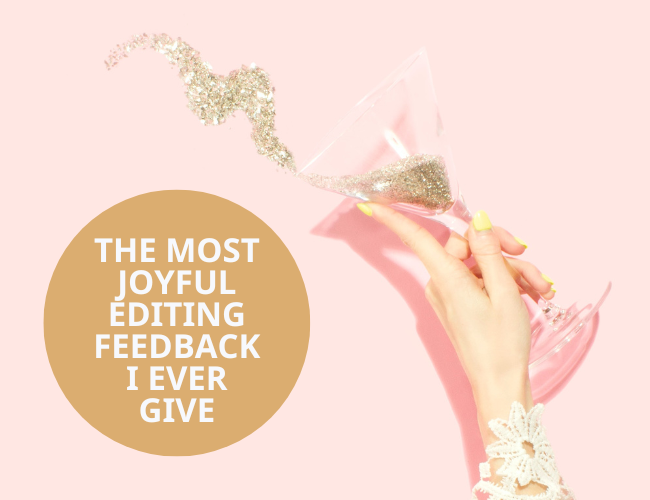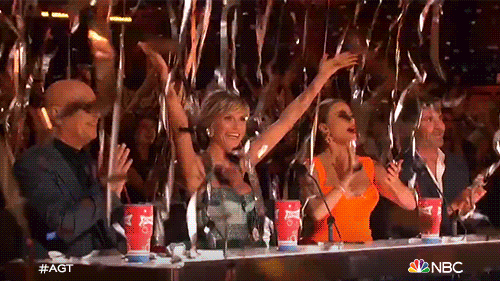You’ve accomplished something incredible this year. No matter where you are in your writing, editing, and publishing journey, you’ve made amazing progress.
I’d love to celebrate with you.

My Favorite Part of Editing Novels
Let me tell you about my favorite part of my job.
It goes like this: A writer that I’ve been working with—we’ve done some rounds of revision, I’ve given them some feedback, they’ve gone back and reworked their pages—sends me their fresh material to read, the new revised chapter, scene, story idea, what have you.
And I read it.
And it is so fantastic that I have nothing to say. And when I get on that call with them, I just applaud.
We just start off with applause because they nailed it. They knocked it out of the park. They’ve written something fantastic. They’ve fixed exactly the problems I was feeling in the scene, and they’ve done it even better than I could imagine.
I couldn’t have written those words for them. They came up with their ideas. They put them on the page. They owned that revision, and they made their piece so much better for it.
That’s my favorite moment.
Writers Feel This, Too
One of the really exciting things about this moment is that normally, after I finish applauding, and finish cheering them on for what an amazing job they’ve done in their last few days of revision, then I check in with them to see how they’re feeling about their work.
And they are beaming.
They say, “It feels so much better.”
They say, “I knew it wasn’t quite right before, but I couldn’t put my finger on why. And then I took this feedback that you gave me, I thought of some things I could do with it, some ways I could change some things based on that feedback, I tried this, and it worked.
“And it feels so much better to me now. It flows. It has the emotion, it has the drive. It’s exciting. It’s interesting. It’s everything I wanted it to be.
“And I can feel that in my gut—like, I didn’t need you to tell me that, Alice, because I can feel it when I read the pages. I knew when I sent it to you, this one’s gonna work.”
I love that. I love that so much.
We Need Both: Objective and Subjective
Because both sides are really important, you know?
As an editor, when I come to a manuscript, I bring all my analytical tools, I do some layers of objective analysis, and I say, “Okay, what have we got here? What’s on the page? What pieces do we have? What pieces do we not have? What pieces are working and what pieces can we refine?”
I do all of this objective analysis to turn what can be a very subjective and confusing process into something with a little bit more direction and grounding.
But that doesn’t negate or replace the subjective knowing of whether a story is working or not.
You can feel it when a story is working. You can feel it because this story is designed to make you feel. So if you read it, and you don’t feel like it’s working, well then, it’s not working because it’s not making you feel.
And you need both pieces.
You need both the objective analysis to see how the story works according to the principles of story that humans have developed over millennia of storytelling.
And you need that subjective feeling, that gut check of, “is it doing what it’s meant to do in your own mind, heart and body?”
Beware of Confidence Without Feedback
Now I will say that I do not recommend relying exclusively on your own judgment for both of these things all the way through your editing process.
And here’s why: your writing is meant to move your readers.
That’s a collaborative process. Your readers must feel the impact of your writing. And you can’t know how it’s going to touch someone outside of you until you share it with someone outside of you.
It is possible, and I’ve seen it happen, for writers to feel that confidence that their story is really, really good, that it’s almost there, when it’s not quite almost there. We have a ways to go before we really make it connect with those readers.
They feel that confidence a little prematurely, before the story’s fully ready.
Why We Feel Premature Confidence
Usually, the reason why they feel that confidence early is because they’ve done a round (or a few rounds) of editing that have significantly leveled up the manuscript.
They remember what it looked like before, and they see what it looks like now, and in comparison, the current version is amazing.
And often by this point, they’ve sent it to some beta readers, and they’ve gotten positive responses.
But these two sets of data, the sense the writer has that their manuscript has improved and the feedback from beta readers that it’s a fun read—well, they don’t give you the full picture.
That writer’s sense that their manuscript has improved is accurate—it has improved tremendously! That’s not a wrong gut feeling; it’s pointing to something true.
But it’s comparing the manuscript to what it used to be, not to what it could become. Editors can see potential that writers often miss.
And beta readers—well, I could go on a whole long spiel about beta readers, but that’s not the point of this episode.
So I’ll just say this: beta readers can give you valuable information about how your book might be received by readers. But beta readers cannot give you reliable data about how well your story is working or what may or may not be left to improve.
The feedback you’ll get from beta readers and the feedback you’ll get from editors or agents or book coaches is completely different. They bear almost no resemblance.
And beta readers, like writers judging their own manuscripts, won’t see what a manuscript could become. They can’t give you feedback on its potential and the opportunities before you to make it even better.
To See How Well Your Story Works, Share It
So when you’re feeling a lot of confidence in how much your story has improved, I highly recommend that you reach out to a book professional—specifically, an editor or book coach—who can see both what’s on the page right now and the potential that lies before you.
An editor can help you find opportunities you didn’t even see to improve your manuscript even more. Or they can reaffirm that you really are done!
And When You Know, We’ll Celebrate Together
That said, I want to give credit where credit is due: I’ve worked with multiple writers who came to me believing that the developmental work on their manuscripts was done and their stories were pretty close to the best that they could be.
And the reason they were in conversation with me in the first place is because even though they felt like the manuscript was pretty much done, they still thought there might be something more they could do to make it even better.
In other words, they felt a gut feeling of done-ness that they could have trusted without question. But instead, they did exactly what I just recommended: they decided to reach out to a book professional who could see the potential that they might not. They decided to investigate whether there was anything they were missing, any opportunities left on the table.
Nine times out of ten, maybe nine point nine times out of ten, I find something they didn’t see that we can level up together.
And it’s those same writers who do feel that gut sense of knowing after we work through some revisions and get them to that point where they have found that magic solution for their story.
They Feel the Magic
When I point out the opportunity to level up the story, they see it, and they agree. Then they dig in and find their way to solve it. The right way to solve it—the one that makes the manuscript even better and even more in line with their vision for the story they’re creating.
The solution that gives them that gut feeling of right-ness, that inner sense that it’s good.
They send me the pages, I read them, and I feel it too. I get on our call and applaud them.
But they hardly need me to. Because when the story finally works, they know.
And I want to celebrate that knowing because it is a very internal and personal thing. Your story is precious to you. You know what you’re trying to accomplish in your story. And you are going to feel it when you get there.
Here’s to You
So in this episode, I don’t have a tip for you about what to edit in your story or how to approach your editing process.
What I want to do is celebrate you.
I want to celebrate the progress that you’re making. I want to celebrate that you’re listening to this podcast week after week.
That you’re seeking out the writing and editing resources and education that are going to help you turn your story from “something that’s really exciting but you don’t know how to communicate it to anybody” into a manuscript where you have a gut knowing that it is working and you are proud to send it out and share it with readers.
I want to celebrate that.
And I want to celebrate all the progress you’ve made this year in your writing and your editing and your learning. I want to applaud you.
So in this episode, I’m just going to do for you what I do for my clients when they get on a call and they have nailed it in their most recent revision. They’re spot on. They did the thing. The pages are working, and I have no more feedback to give.
Here’s to you.

Happy editing. I’ll see you in the new year.
